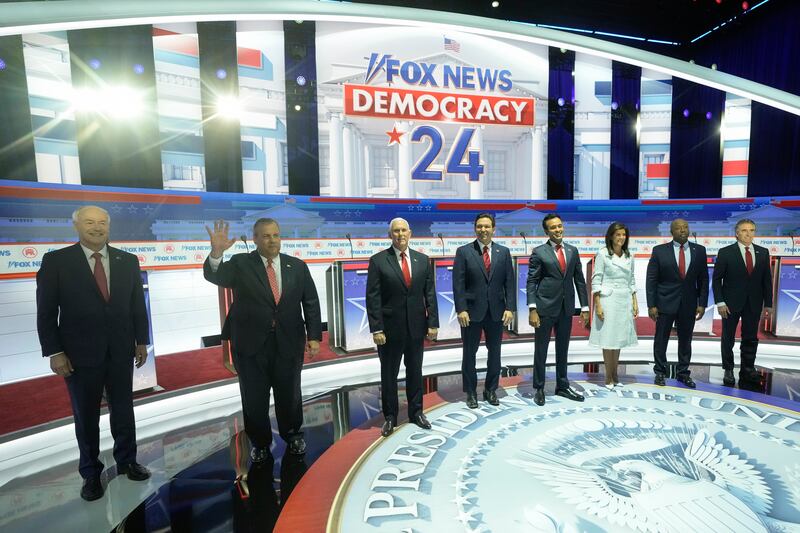Moments before the start of the GOP presidential debate in Milwaukee, Fox News ran clips of people who were asked what they would be looking for in the debate. One woman responded that she didn’t care about the personalities, just their policies. “I don’t need to like my president,” she said.
That’s a sentiment that’s been expressed before, most recently in defense of former President Donald Trump, but that’s not what most political analysts and campaign managers think. In the modern campaign, likability is considered an important factor in how a candidate is received — especially if that candidate is a woman.
Hillary Clinton, in particular, struggled with the issue, so much so that in 2016, The Washington Post published a column entitled “Is she likable enough?” Clinton herself once jokingly acknowledged the problem, saying, “I apparently remind some people of their mother-in-law or their boss, or something.”
So what is likability? In pop culture, the quality has been reduced to what has become known as “the beer question” — which candidate would you most like to have a beer with? — although with the increasing number of people shunning alcohol, that question needs an update. (It’s also worth noting that a plurality of voters in 2016 chose Donald Trump when asked that question, despite the fact that Trump doesn’t drink.)
Despite the widespread prevalence of what’s been called Trump Derangement Syndrome (a heightened hatred of Trump), the former president was still scoring high in likability on social media the night of the debate, despite the fact that he wasn’t a participant.
People were even rating the Fox personalities who moderated the event on their likability.
As for the candidates on the debate stage, the assessment was mixed, with Tim Scott, Nikki Haley, Vivek Ramaswamy, Doug Burgum, Asa Hutchinson and even Mike Pence getting kudos for likability. (Interestingly, Ramaswamy got picked for being both the most and least likable.)
Not surprisingly, given all the previous conversation about his likability, or lack thereof, DeSantis was largely seen as not having cleared the bar. (DeSantis is so famously uncomfortable at small talk that he’s now being seen as a sort of soul mate for socially awkward people.)
But perhaps most surprising of the X likability ratings were the people who found Chris Christie, the bulldog of New Jersey, the most likable of all the candidates. Christie was once deemed in Politico “New Jersey’s least popular governor, ever.” He was also booed several times during the debate.
Admittedly, every single tweet lauding Christie as likable could have been posted by a paid staffer. For that matter, so could most of the others. “Public opinion” is not always shaped by the public, after all.
This leads to another problem in the “likability” debate — a candidate’s likability among voters may have a strong correlation to his or her likability among the news media.
As Leonard Steinhorn wrote for The Hill in 2015, “For the candidate deemed ‘unlikable’ by the press, it’s an uphill battle to reverse the narrative.” And that narrative can be compounded not only by words, but photographs that are published.
Of course, the real test of likability on the stage will be how candidates perform in post-debate polls. One of the first to come out was from FiveThirtyEight, which polled people before and after the debate and then analyzed the changes in how they viewed the candidates.
Likable or not, DeSantis did well, as did Haley.
“Haley saw a 14-point increase in her favorable rating with virtually no change to her unfavorable rating, while DeSantis increased his net favorability rating from +41 points to +48 points,” FiveThirtyEight reported. “Ramaswamy and Hutchinson also saw their favorable ratings rise by double digits after the debate — but their unfavorable ratings rose even more, so they are now less popular on net after the debate than they were before it.”
“Likeability” and “favorability,” of course, aren’t the same thing; you can favor a candidate without liking them, as the woman Fox quoted at the start of the debate broadcast said.
Still, Republican candidates might want to keep an eye on the likability ratings of one other person — Joe Biden, who most recently polled at just slightly above 38% likable, 17% not.


